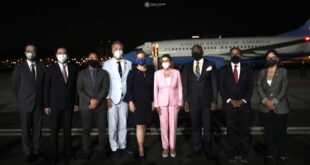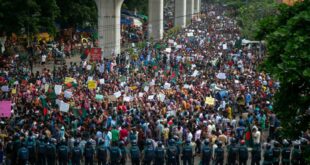Giancarlo Elia Valori
During the last months of the year which is drawing to a close, in a world distracted by the Covid 19 pandemic, the U.S. Presidential elections and Brexit, geopolitics has recorded important evolutions probably destined to radically changing the scenarios in the Middle East and its Asian neighbouring areas.
The main protagonists of these changes have been fighting each other with weapons and words for seventy years but, with unexpected political and strategic realism and using the confidential channels of “back bench diplomacy”, they have achieved a turning point that it is not a big leap to define as historic.
After decades of conflict, Israel and the most important countries of the Arab-Muslim world have not only initiated a political-diplomatic dialogue – unthinkable until a few months ago – but also a series of joint operations with the aim of isolating the common enemy, namely the Iran of Ayatollahs, and secretly working together to redefine the set-up of a region that for decades has been a major source of instability at global level.
In a matter of weeks, under the careful direction of Donald Trump and the Saudi Crown Prince, Mohammed Bin Salman, Israel established diplomatic relations with the United Arab Emirates, Bahrain, Sudan and the Kingdom of Morocco.
At the same time, it resumed dialogue and relations – interrupted since 2009 – with Turkey, a country that due to the adventurism of its President, Tayyp Recep Erdogan, was on the verge of international isolation as, in a short lapse of time, it had made more enemies than it could reasonably manage.
In the small “thirty years’ war” opposing Christian Armenia to Muslim Azerbaijan for the control of the disputed Christian region of Nagorno- Karabakh, the resumption of Turkish-Israeli relations and the new relations between Israel and the Arab Emirates had a decisive impact on the resumption of the armed conflict between Armenians and Azerbaijanis who, on September 27, resumed shooting each other.
The clashes saw the defeat of the Armenians thanks to the essential contribution provided to the Azerbaijani armed forces by the drones that President Erdogan made available to the Azerbaijani Turkmen “brothers”, which led to the quick defeat of the Armenians, somehow saved by the providential intervention of Russia, which guaranteed the armistice between the parties and the control of the ceasefire lines.
Actually, according to reliable Israeli diplomatic sources, the decisive turning point in the brief but violent September conflict was the technology secretly supplied – with Turkey’s consent – by Israel to Azerbaijan, thanks to which Turkish drones could carry out decisive strikes against Armenian armoured forces.
This technology features modern field sensors and, above all, electronic instruments capable of tracing the terrain topography in the most minute detail. They are ultra-modern means which, according to sources, have enabled Azerbaijan to easily hit its opponents and Israel to experiment – on a terrain very similar to neighbouring Iran’s – war technologies that will be very useful if and when the conflict with Iran moves from words to deeds.
The collaboration between Israel and Azerbaijan has been largely the result of the work carried out by the Israeli intelligence ret service, the Mossad, which for several years has not only been conducting intelligence operations in Azerbaijani territory against Iran, but has also been promoting the supply of sophisticated military technology to the Azerbaijani armed forces, thanks to which the Azerbaijani military doctrine has been modernized – in mentality and tools – to such an extent as to make the small Azerbaijani army an agile, efficient and deadly war machine.
Therefore, while Turkey supported Azerbaijan by supplying drones and Syrian mercenaries returning from the conflict against Bashar Al Assad, Israel secretly provided tools and advice that turned out to be essential for the outcome of the brief but bloody conflict.
After all, thanks to the Mossad’s work, Azerbaijan has been enriching itself with war technology and modern military culture for years.
Since 2010, thanks to cooperation in the field of intelligence, Azerbaijan has managed to sign a contract with the Israeli Elta System, a subsidiary of Israel Aerospace Industries (IAI), for the creation of a “Digital Terrain Model” (MDT) of the whole Nagorno-Karabakh, an accurate representation of the Armenian enclave’s mountainous terrain resulting from the interaction of a set of tools (from satellite imagery, to radar surveys and human “sensors” on the ground) that enabled the Azerbaijani armed forces to quickly settle accounts with Armenian opponents.
In addition to the drones supplied by Turkey, a secret and essential contribution was provided by the Israeli Harop “kamikaze drones”, produced by IAI and equipped with guidance systems governed by Artificial Intelligence.
The Harop drones were sent to Azerbaijan from the Israeli military base of Ovda for all six weeks of the conflict and enabled the Azerbaijani forces to locate with millimetre precision the positions of the adversary forces in a mountainous and difficult terrain such as Karabakh, providing the missile and artillery batteries with essential and timely information. The Harop drones operated, with intelligence and guidance, not only in support of Turkish drones but also of Israeli Sky Striker drones, produced by Elbit System of Haifa, and Azeri Orbiterdrones, built under a partnership between the Azeri company Azad System and the Israeli Aeronautic Defence System.
Therefore, while by supporting the Azerbaijani Turkmen Muslims, Israel has taken advantage of the six weeks of conflict to test weapons and systems on a terrain very similar to Iran’s and, at the same time, to resume the underground dialogue with Turkey, the latter – according to very reliable sources – is even trying to repopulate the areas of Nagorno- Karabakh left by the Armenian refugees with Syrian militiamen and their families.
The Turkish intelligence service (MIT), which has been involved since last October in the clandestine transfer of several hundred militiamen of the “Sultan Murad Division” from Syria to Karabakh, has recently asked the Syrian militiamen to settle with their families – specially brought from Syria – in the houses left by Armenians not only to militarily guard the territory, but also to populate an area traditionally inhabited by Armenian Christians with Turkmen Muslims (as the Syrians of Murad are).
While in the areas disputed between Armenians and Azerbaijanis the political-military understanding between Israel and Turkey is strengthening (it should be recalled that Turkey was the first and for many decades the only Muslim nation to recognize the State of Israel), in other areas Israel’s new “companions on the road”, the United Arab Emirates, are playing a game that could bring them into conflict with Turkey.
The Crown Prince of Abu Dhabi, Mohamed bin Zayed Al Najan – through the Emirates’ International Golden Group – finances the activities of the Wagner Group, a Russian paramilitary and mercenary organization that Russian President Putin has deployed in Libya in support of General Khalifa Haftar, leader of Cyrenaica and arch-enemy of the Tripoli rulers supported by Erdogan’s Turkey.
The strategic vision of the Emirates’ Crown Prince is designed to opposing – always and everywhere – the “Muslim Brotherhood”, i.e. the fundamentalist Salafist sect which for years has been trying to destabilize the secular Arab governments of the whole Middle East.
The “Muslim Brotherhood” is not looked unfavourably by Turkish Prime Minister Erdogan who, after imposing an Islamist drift on his country, has collaborated with branches of the “Brotherhood” in Syria and continues to support – in Libya – the “Misrata Brigades”, composed of Islamist militiamen close to the “Muslim Brotherhood” that support Al-Sarraj’s government in Tripoli.
It is the hatred towards the “Muslim Brotherhood” that has pushed the Emirates to provide armoured vehicles to Christian Armenia in the conflict with Muslim Azerbaijan and has led Prince Zayed Al Najaf to maintain – with Israel – that the “Brotherhood” is more dangerous than Iran and therefore must be fought in every region.
The Emirates supply Russian, Chinese and North Korean armaments to all their regional and extra-regional protegés.
Under the benevolent gaze of Russia and France and the worried one of the new U.S. Administration, Abu Dhabi has largely supplied General Haftar’s forces in Libya, by sending MI-24P helicopters, SA-3 missiles and Russian T 72 tanks to Benghazi from Belarus.
The activism of the Emirates’ Crown Prince worries and annoys Turkish Prime Minister Erdogan, who sees his dream of making Turkey the only counterpart of the Muslim world with the West – as a hegemonic power in the region and a compulsory point of reference for its relations with NATO and Israel – moving ever farther away.
The Turkish dream, however, is bound to create problems and tensions in the short, medium and long term.
GIANCARLO ELIA VALORI
Honorable de l’Académie des Sciences de l’Institut de France
President of International World Group
 Geostrategic Media Political Commentary, Analysis, Security, Defense
Geostrategic Media Political Commentary, Analysis, Security, Defense





